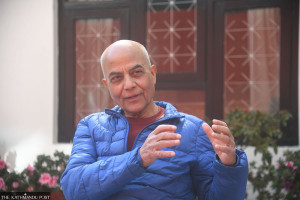Interviews
It does not suit the Congress to change its position on transitional justice
The main intent behind demanding a parliamentary probe against the home minister is to ask for his resignation once the probe committee is formed.
Binod Ghimire
The budget session of the federal parliament starts Friday without the resolution of the long-standing differences between the ruling and opposition parties over the formation of a parliamentary committee to investigate alleged cooperative fraud charges against Rabi Lamichhane, deputy prime minister and minister for home affairs. While several bills await parliamentary approval, whether the House will function smoothly is still uncertain. The Post’s Binod Ghimire sat down with Padam Giri, minister for law, justice and parliamentary affairs, to discuss the government’s plan to make the House productive and its effort to get crucial bills endorsed in the upcoming session. He is also a CPN-UML central committee member. Excerpts:
The new session is starting without resolving the old deadlock. How will you ensure its smooth functioning?
The Nepali Congress should revisit its demand for the formation of a parliamentary committee targeting a particular person. This is not natural. What are the problems facing the cooperative sector as a whole, which types of fraudulent acts have taken place and who is involved in those cases, however, can be studied. We can constitute a parliamentary committee or other types of panels for such study, which can even recommend actions against those involved in fraud. Why should the main opposition shy away from a detailed study of the entire cooperative sector and want to focus on a particular case and a particular person? I am hopeful the Congress being a responsible democratic party will agree on forming a panel with a broader mandate.
The prime minister on Saturday said a probe committee can be formed. What kind of committee is he talking about?
He is talking about a committee to study the malpractices prevalent in the cooperative sector, to identify the problems, suggest their solutions while also recommending actions against those involved in fraudulent activities. The main intent behind demanding a probe against a particular person is that once a committee is formed, the party [the Congress] will ask for his resignation. It is an ill-intended demand aimed at creating problems. Media have reported problems in several cooperatives. Would it be feasible to form separate probe committees for each incident? We are in continuous informal discussions with the main opposition and there are plans to discuss the matter formally in an all-party meeting to be held very soon.
How will the budget get endorsed if Congress continues to obstruct the House in case the probe panel is not formed as per its demand?
Why just probe the home minister and the cooperative where he is allegedly involved? Why not investigate the cooperatives where the leaders from the Congress or any other party might also be involved? We are hopeful that the Congress will analyse whether its demand is rational. I cannot believe it will block budget endorsement.
Have you identified why the federal parliament has become so unproductive in terms of bill endorsement?
The performance of the parliament is not satisfactory. Getting the bills endorsed as quickly as possible has been my priority ever since taking charge of the ministry. Three bills have been endorsed after I became the minister just two months back. Before that, only one bill had gotten through the parliament in more than one year since the present House of Representatives came into being. That was a matter of shame.
Despite the UML then being the opposition party, we had raised the issue in the parliament. It is the government’s responsibility to facilitate the deliberations over the bill and their endorsement. As a law, justice and parliamentary affairs minister, it is my major responsibility to make sure the House sessions are fruitful. I am working accordingly.
There are 24 bills under consideration in the federal parliament including 23 under the lower house. I am taking initiatives to get them endorsed in the forthcoming session. The amendment bill to the Enforced Disappearances Enquiry, Truth and Reconciliation Commission (TJ) Act, school education bill, bill to amend some Nepal Acts, amendment bill to the Banking Office and Punishment Act, among others, are our top priorities.
In January your ministry had identified 109 bills that needed to be presented and endorsed. But only two of them have been registered in the parliament. Why?
Our ministry has already consented to different ministries to draft 23 bills. The ministry itself is working on eight more. Several of those bills will be registered in the upcoming session.
There are complaints that the bill drafting process is not consultative, which is why many of them are controversial. What is obstructing such broad discussions?
I agree that the bills drafted after broad discussions are less contentious. The respective ministries should ensure maximum engagement in the drafting process. If the current bills are drafted without proper consultation, there is room to accommodate diverse voices while they are discussed in the House committees. It won’t be possible to take discussions over all the bills to the public. However, some bills that are closely tied to public concerns need to be discussed at the provincial level or even at the local level, if possible. I also have realised the necessity of broader consultation and commit to it in the days to come.
Let’s come to an amendment bill on the Transitional Justice Act. What is stopping the bill from being finalised?
The Law, Justice and Human Rights Committee of the parliament has resolved most contentious issues after long discussions. We are close to finding meeting points on some disputed issues. We continue to engage in formal and informal discussions among the parties, with a plan to endorse it from the upcoming session. The Congress, when in government, didn’t have any differences over the bill. Rather our party had some concerns, which we are trying to sort out.
I don’t think it suits the Congress to change its position after being sent to the opposition. People are closely following the position of the different parties on the bill.
Listing murder as a serious violation and reduced sentencing are visibly the most contentious issues on the bill. What is the meeting point on these issues?
Our party’s [the UML’s] position is clear. All killings of the disarmed people other than in the clashes are serious violations of human rights. All the parties have a common view over reduced sentencing but there are differences over its modality.
We must be mindful that our transitional justice process delivers justice to the victims. The process cannot move ahead amid reservations from the victims. It is meaningless to push ahead with a process that is not acceptable to concerned stakeholders including the international community.
The discussions among the parties are largely focused on these issues. From next week, the House committee will resume deliberations.
A committee to recommend the names of the office bearers in two transitional justice commissions has been formed amid reservations from different quarters. Will it still recommend the names or wait until the bill is endorsed?
Let us not forget that the committee was formed in line with a time-bound Supreme Court verdict. How can we ignore the court’s order? A bill doesn’t get endorsed in the government’s interest. It is a prerogative of the sovereign parliament. Demanding a halt to the formation of the recommendation committee when the court has already given its verdict is not a responsible act.
I have come to know that the National Human Rights Commission hasn’t sent its representative to the committee, which is wrong. Being a responsible constitutional body it can’t baulk at implementing the court's order. It should send its representative. If there are concerns, s/he can present them before the committee.
The committee has inducted two retired judges as its members which was the demands of the victims and the other stakeholders. Similarly, there has been an agreement that two members of the five-member commissions will be retired judges. We have tried to abide by the victims’ concerns as much as we can.
When will the Supreme Court get justices in vacant positions?
Three positions are already vacant and the fourth will be vacant in a matter of a month or so. Justices for all four positions will be selected in a week or two.
Voices are growing mainly from the Congress to amend the constitution to revisit the electoral system. What is your opinion?
There has been no discussion on changing the electoral modality. Yes, there is a growing concern that we should find a way to ensure greater stability. We need to discuss how.
Is there any possibility of the UML and Congress coming together to form a government?
This is now a closed chapter. The two parties had tried to find out possibilities for a tie-up when the present coalition was not even formed. Now there are no such discussions, formally or informally.




 10.12°C Kathmandu
10.12°C Kathmandu



.jpg&w=200&height=120)








